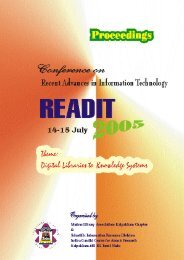IGCAR : Annual Report - Indira Gandhi Centre for Atomic Research
IGCAR : Annual Report - Indira Gandhi Centre for Atomic Research
IGCAR : Annual Report - Indira Gandhi Centre for Atomic Research
You also want an ePaper? Increase the reach of your titles
YUMPU automatically turns print PDFs into web optimized ePapers that Google loves.
The Reprocessing Group (Rp G)of <strong>IGCAR</strong> is responsible <strong>for</strong> the development of Fast reactor fuel reprocessing<br />
technology and construction of the reprocessing plants. RDL has two hot cell facilities: In one of them,<br />
U-233 was recovered from irradiated thorium rods on campaign basis and used as fuel in KAMINI reactor<br />
and in FBTR (as PFBR test fuel). The other hot cell facility, called, CORAL (COmpact facility <strong>for</strong><br />
Reprocessing Advanced fuels in Lead cells) commissioned in 2003, is a test bed <strong>for</strong> validating the process<br />
flow sheet and scaling up of equipment designs <strong>for</strong> fast reactor fuel reprocessing, by processing the FBTR<br />
fuel itself. CORAL has already processed in several campaigns mixed carbide fuels irradiated in FBTR with<br />
25, 50, 100 and 155 GWd/t burnups. This has provided valuable experience to the design of<br />
Demonstration Fast Reactor Fuel Reprocessing Plant, DFRP, in which the FBTR fuels will be reprocessed<br />
on a regular basis. DFRP, which will also demonstrate the reprocessing of PFBR fuel subassemblies, is slated<br />
<strong>for</strong> commissioning by 2009. RpG is also carrying out the design of the reprocessing plant, FRP, <strong>for</strong><br />
reprocessing spent fuels of PFBR on commercial basis. Various R&D activities are being carried in the<br />
Reprocessing Development Laboratory. Engineering scale testing of equipment and systems are done here<br />
be<strong>for</strong>e installing in <strong>for</strong> hot cell. Chopper, dissolver, feed clarification equipment, centrifugal extractors are<br />
few of the important equipment developed at RDL. Apart from equipment development, research is undertaken<br />
<strong>for</strong> understanding and solving various process and chemistry problems of fast reactor fuel reprocessing<br />
such as, mathematical modeling of solvent extraction of the complex U-Pu system, efficient solvent<br />
management, development of online monitoring of Pu <strong>for</strong> process control, liquid flow metering in high<br />
radio active fields etc.,<br />
Chemistry Group<br />
Dr. P. R. Vasudeva Rao<br />
Director<br />
Dr. T. Gnanasekaran<br />
Head, LMSCD<br />
Dr. T. G. Srinivasan<br />
Head, FChD<br />
Dr. V. Ganesan<br />
Head, MCD<br />
Shri K.C. Srinivas<br />
Head, CFD<br />
The Chemistry Group is responsible <strong>for</strong> carrying out R & D to provide inputs with respect to all the chemistry<br />
aspects of the fast reactor and its fuel cycle. In addition, it also takes up R&D programmes which<br />
would have a long term impact on the reactor programmes. Besides the R&D activities, the Chemistry<br />
Group also provides extensive analytical support using a wide range of analytical techniques to all the programmes<br />
in the <strong>Centre</strong>. The Chemistry Group has also specialized in setting up of facilities <strong>for</strong> experiments<br />
with radioactive or air-sensitive materials, and in indigenous development of chemical instrumentation.<br />
The areas of R & D in Chemistry Group include sodium chemistry, chemistry of un-irradiated as well as<br />
irradiated fuel materials, development of fuel cycle, analytical chemistry, spectroscopy and more recently,<br />
boron chemistry. Development of sensors <strong>for</strong> PFBR and sensors <strong>for</strong> environmental applications, cover gas<br />
205

















